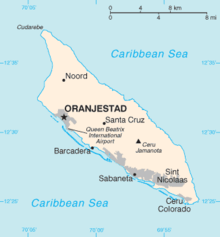Bibliography of Aruba
This is a list of books in the English language which deal with Aruba and its geography, history, inhabitants, culture, biota, etc.
- Aymer, Paula L. - Uprooted Women: Migrant Domestics in the Caribbean.[1][2]
- Brown, Enid - Suriname and the Netherlands Antilles: An Annotated English-Language Bibliography.[3]
- Gerber, Stanford N. - The Family in the Caribbean: Proceedings of the 2nd Conference on the Family in the Caribbean, Aruba, 1969.[4]
- Green, Vera M. - Migrants in Aruba: Interethnic Integration.[5]
- Hartert, Ernst - On the Birds of the Islands of Aruba, Curacao, and Bonaire.[6]
- Schoenhals, Kai, compiled - Netherlands Antilles and Aruba. [7]


Notes
- Conway, Dennis (Spring 1999). "Uprooted Women: Migrant Domestics in the Caribbean". The International Migration Review. 33 (1): 210–212. doi:10.2307/2547337. JSTOR 40166484.
- Burgess, Norma J. (September 1998). "Uprooted Women: Migrant Domestics in the Caribbean". Contemporary Sociology. 27 (5): 511–512. doi:10.2307/2654520. JSTOR 34889616.
- Hoefte, Rosemarijn (October 1993). "Review: Hartert on Birds from Aruba, Bonaire and Curacao". The Hispanic American Historical Review. 73 (4): 677. JSTOR 6114727.
- Craig, Susan (1979). "Review: Millstones or Milestones?". Latin American Research Review. The Latin American Studies Association. 14 (3): 256–263. JSTOR 2502983.
- Green, James W. (September 1975). "Review". American Anthropologist. New. Blackwell Publishing on behalf of the American Anthropological Association. 77 (3): 648–649. doi:10.1525/aa.1975.77.3.02a00490. JSTOR 673439.
- F. M. C. (October 1893). "Review: Hartert on Birds from Aruba, Bonaire and Curacao". The Auk. University of California Press on behalf of the American Ornithologists' Union. 10 (4): 355–357. JSTOR 4067829.
- Coutts, B. E. (September 1994). "Reference: Netherlands Antilles and Aruba (World bibliographical series, 168) compiled by Kai Schoenhals". Choice. 32 (1): 78. JSTOR 7258919.
gollark: Oh, it definitely slows down spread. I'm just saying that it doesn't *stop* it, which is why you still have new cases.
gollark: If everyone were isolated in airtight chambers and never left for probably a month or so you would get rid of viruses. But we can't do that, unfortunately.
gollark: Yes, and that's not total enough to totally stop spread.
gollark: Probably because you cannot actually do *total* lockdown.
gollark: It's very modern-web.
This article is issued from Wikipedia. The text is licensed under Creative Commons - Attribution - Sharealike. Additional terms may apply for the media files.